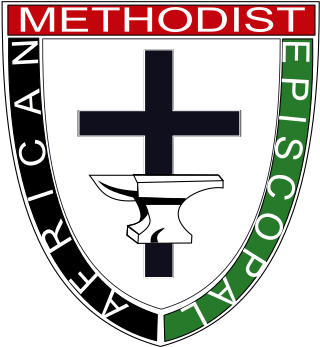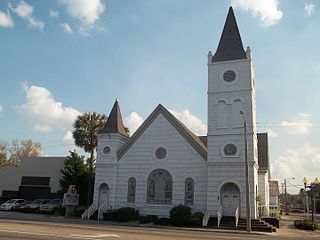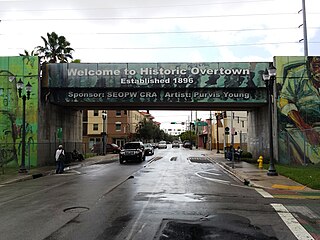The African Union First Colored Methodist Protestant Church and Connection, usually called "the A.U.M.P. Church", is a Methodist denomination. It was chartered by Peter Spencer (1782–1843) in Wilmington, Delaware, in 1813 as the "Union Church of Africans", where it became known as the "African Union Church".

The African Methodist Episcopal Church, usually called the AME Church or AME, is a Methodist Black church. It adheres to Wesleyan-Arminian theology and has a connexional polity. The first independent Protestant denomination to be founded by Black people, AME welcomes and has members of all ethnicities.

The black church is the faith and body of Christian denominations and congregations in the United States that predominantly minister to, and are also led by African Americans, as well as these churches' collective traditions and members. The term "black church" may also refer to individual congregations, including in traditionally white-led denominations.

Overtown is a neighborhood of Miami, Florida, United States, just northwest of Downtown Miami. Originally called Colored Town in the Jim Crow era of the late 19th through the mid-20th century, the area was once the preeminent and is the historic center for commerce in the black community in Miami and South Florida.
Mount Zion is a hill in Jerusalem.
Cherryville Township is a township in northwestern Gaston County, North Carolina, United States. As of the 2010 census it had a population of 16,500. It includes the incorporated city of Cherryville, the inactive incorporated town of Dellview, the unincorporated community of Tryon, and a portion of the town of High Shoals. It is represented on the Gaston County Board of Commissioners by Allen Fraley of Cherryville.

Mount Carmel A.M.E. Zion Church & Campground is a historic African Methodist Episcopal Zion camp meeting grounds in Heath Springs, South Carolina, Lancaster County, South Carolina. It was established in 1866 and consists of a complex of approximately 55 small "cabins" or "tents" and the brick church of Mt. Carmel A.M.E. Zion Church is located in the general form of a rectangle. Mount Carmel A.M.E Zion Church Campmeeting starts every year on the first Wednesday in September, and last for 4–5 days. An "arbor," or open-air structure, is located in the center of the complex, where music, gospel singing, praise and worship, preaching and teachings are held. People come to worship, fellowship, network, and eat food from as far as New York City, NY to Orlando, FL. There is also a section on the grounds for vendors. The majority of the cabins are small frame, some are two story cabins for larger families made from concrete block and wooden structures. Also on the property is the church cemetery.

Turnersburg Township is a nonfunctioning administrative division in northeastern Iredell County, North Carolina, United States. Turnersburg township was established in 1868. The only major town in Turnersburg township is Harmony, which is also partially within Eagle Mills township.
The African American Cultural Heritage Action Fund is a program formed in 2017 to aid stewards of Black cultural sites throughout the nation in preserving both physical landmarks, their material collections and associated narratives. It was organized under the auspices of the National Trust for Historic Preservation. The initiative which awards grants to select applicants and advocates of Black history has been led by architectural historian Brent Leggs since 2019. It is the largest program in America to preserve places associated with Black history.











